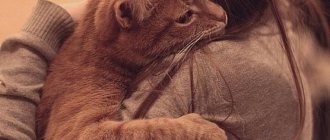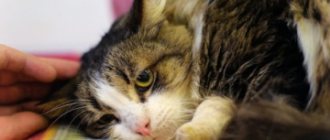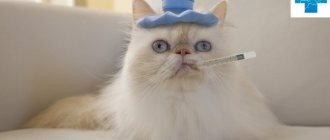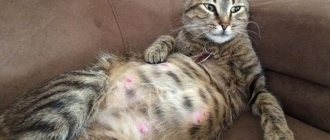Unfortunately, nothing in the world lasts forever and death accompanies us throughout our lives. Of course, the loss of a loved one cannot be compared with the departure of another cat into the world. But sometimes you become so attached to your beloved pet that you consider it a member of the family.
Owners rarely have to watch cats die. And all because most of them prefer to face death far from home, completely alone. But this does not always happen, since not everyone has the opportunity to go outside. To understand that the cat is dying and the time has come to let him go on his last journey, specific symptoms of his approaching death will help. After all, it is important to provide proper care for him during this difficult period.
How can you tell if a cat is dying?
Superficial signs that the cat will soon leave our world are:
- An attempt at privacy. The cat is always going somewhere and doesn’t want to be with you;
- Quiet breathing. It seems that the pet is not breathing at all;
- Wheezing, like a person who has asthma;
- Body temperature decreases;
- The cat's voice becomes barely audible.
All these symptoms are not exclusively signs of old age. Sometimes, this is how some diseases manifest themselves. Therefore, it doesn’t hurt to take the cat to the vet. Perhaps the animal will still be able to live normally for a couple of years.
What to do if the cat dies?
If the cat is definitely dying of old age, it is worth brightening up his last days. Have your veterinarian prescribe pain medication or vitamins for your pet.
And you should not disturb the animal and create a good bed for it, where it can retire. You should also pay great attention to feeding your pet. After all, many old cats are not able to eat on their own.
Sometimes, it is easier to euthanize an animal so that it does not suffer. But this is a controversial issue. You can resort to this method only if the cat is really experiencing severe suffering and definitely cannot return to normal life.
What can a cat die from?
Many people believe that signs that a cat is dying may appear in old age. But there are a lot of diseases that can kill an animal. And these include:
- Ear mite;
- Feline immunodeficiency virus;
- Infectious enteritis (plague);
- Rabies;
- Urological syndrome.
A cat can become infected while walking outside or by eating its prey (for example, an infected rat). Many such diseases are completely curable. Therefore, it is necessary to take cats to the veterinarian every few months.
This will not only improve the health of the animal, but also prolong its life. After all, the less a cat is sick in its youth, the longer its noble old age will last.
How to cope with the death of a pet?
If the cat has died and you are worried, then you should get another animal. This way you will brighten up your loneliness and sadness. It must be remembered that cats rarely live more than 15-20 years. Therefore, if you take home an adult, sooner or later you will have to send it on its last journey.
It is also worth remembering that a normal death is much better than a life of torture. This means that the old pet has gotten rid of its torments and is worth rejoicing for.
To quickly forget about an animal, you can cremate it. Such services are offered in many cities. But burial causes additional negative emotions and makes you remember everything again and again.
And remember that a little pain of loss is a normal reaction of the body. But you shouldn’t grieve for more than a few days. After all, there are many stray kittens in the world that can become your new pets.
Unfortunately, nothing living on this earth lasts forever. Our beloved pets may also die sooner or later. This article will talk about how cats die.
How to bury a pet, will it be possible to rebury it?
Owners of deceased pets are forced to decide how to bury their tailed family member. If the cat’s owner resorted to the procedure of euthanasia, the veterinary clinic will offer to bury it themselves, or, more precisely, cremate it. In other cases, in order to bury a cat, you will have to contact a veterinarian and act in accordance with his instructions.
In Russia, burying animals in the ground is prohibited by law. The corpses of animals and birds are equated to biological waste and are disposed of in accordance with the order of the Chief State Veterinary Inspector of the Russian Federation dated December 4, 1994 No. 13-7-2/469. According to this order, corpses are disinfected and burned.
In some municipalities, special places are allocated for burying pets. To bury a pet in such a cemetery, the owner must present a veterinary certificate in form No. 4. The animal's corpse will be opened, the cause of death will be determined, and if it was not the result of an infection, it will be buried without being burned. Otherwise, the body will be disinfected, cremated and only then buried.
It is impossible to rebury a pet without breaking the law. For violating the requirements of the law, a loving owner who buried his deceased pet in a yard or forested area risks paying a fine of 5,000 rubles.
Why does a cat go to die?
Often, owners cannot understand why the animal they cherished leaves home without saying goodbye and dies alone. The cat does not know how to explain what exactly is bothering her and is in enormous pre-death stress. She doesn't need anyone near her. She is not a person and cannot ask for support and an explanation of what is happening to her. If a cat begins to hide from its owners in the most distant and inaccessible places, this is the answer to the question of how to understand that a cat is dying.
This does not mean at all that the cat does not love its owners. She’s just in deep confusion at this moment and the only way out seems to her to be to hide from everyone, including her owners. We are not given the opportunity to understand what a cat feels at the moment of death. After all, everything is different with us. A person is ready for the fact that sooner or later he will have to leave this world, and he understands this if he is seriously ill.
If something starts to hurt a cat, she does not understand what is happening to her, and she cannot prevent it. Cats think that the pain was caused externally, as a result of an attack, they do not distinguish between types of pain and do not understand where it comes from. That's why cats go off to die. They hide from the attacker and wait for their unbearable torment to end. But, unfortunately, this leads to the fact that they die alone, without waiting for the pain to go away.
Another thing that distinguishes a cat from a person is that when a person dies, he is scared, he cannot imagine what it’s like there in the next world. A person is very afraid of death. He is afraid of her throughout his life. He is afraid of the thought that life will someday be interrupted and he will have to leave this world forever.
This fear is absent in cats for the reason that they simply do not know what death is. Frightening thoughts come to them only at the moment when death has come very close. It often happens that a cat dies at home, but this happens in a place where no one can find her; she preferred loneliness.
The cause of death for cats can be serious illness, injury, old age, or an accident. Anticipating an imminent end, the animal often leaves its home, never to return. It is natural that the question arises why cats leave home to die. After all, even if the pet does not have the opportunity to leave the apartment, it simply hides in an inaccessible place, for example, somewhere in a closet.
There is no clear answer as to why this happens. There are several versions of this pattern, none of them have been scientifically confirmed.
Symptoms of imminent death
You can understand that your pet will soon leave the world of the living by the presence of certain characteristic signs. Older cats over 12 years of age should be taken to a veterinarian for routine checkups to closely monitor their general health.
If characteristic symptoms appear, you should contact a qualified veterinarian as soon as possible. Perhaps the cat is very sick and needs help, but it can still be saved. Timely therapeutic measures will extend the life of a pet with chronic pathologies of the body for several years. In this case, timely treatment will give good results - the animal will not suffer and suffer.
Characteristic symptoms of impending death in a cat:
- Change in eating behavior. Cats begin to eat very little or they lose the desire to eat altogether. After some time, the drinking regime is also disrupted - the cats refuse to drink. The owner should be alert to the following signs: untouched food, no trips to the litter box for more than 48 hours, excrement with bloody discharge, cloudy and dark-colored urine. Some time after refusing food, the animal becomes physically exhausted, the coat becomes dull and falls out in clumps. The animal tries to move less and constantly lies down. Control of the bowel muscles and urinary sphincter is impaired, leading to involuntary bowel movements.
- Breathing problems. A change in breathing rhythm is a clear sign of serious disorders in the body, indicating an imminent death. This is due to the fact that the myocardium cannot cope with its work, and the amount of oxygen needed by the body’s cells in the bloodstream decreases sharply. The cat begins to breathe heavily and frequently, trying to make up for losses as much as possible. It is important to remember that in a healthy animal, the respiratory rate within 60 seconds should be at least 20 times. Weak and intermittent breathing indicates the imminent death of the pet. In order to accurately determine the frequency of respiratory movements, you need to use a stopwatch and observe how many times the chest rises and falls within 1 minute.
- Heart rhythm disturbances and changes in blood pressure. A clear sign of an animal's imminent death is a slowdown in the frequency of contractions of the heart muscle. The normal heart rate in a healthy animal is from 125 to 145 beats per minute. A sharp change in indicators indicates difficulties with pumping blood throughout the body. To measure your pet's pulse, you need to place your open palm on the left side, behind the front limb, and count how many beats there were within 15 seconds. Multiplied by 4, the resulting figure should not be less than 60. Otherwise, the signs of imminent death are obvious.
- The presence of a specific odor from the animal. As a result of a sharp decrease in the performance of all organs of the animal, the removal of toxic substances from the body slows down, and in some cases completely stops. Toxic substances begin to accumulate in the body and cause an unpleasant odor throughout the body. First of all, from the pet's mouth.
- Decreased body temperature. Hypothermia is associated with a decrease or cessation of internal organ function. The temperature drops to 37-37.5 degrees, which indicates weakness of heart contractions. If you don't have a measuring device at hand, you can touch the cat's paw pads. They become noticeably cool.
Signs and superstitions
In England it is considered a very bad omen if a cat dies in the house. By leaving, the pet brings disaster to its inhabitants. And if a cat jumped over a coffin with the body of a deceased person, then it had to be killed, otherwise misfortune could not be avoided. Although this nation has always been distrustful of representatives of the cat family, endowing them with witchcraft abilities and mystical properties.
There was a completely different attitude towards cats in Ancient Egypt, where they were revered and elevated to the rank of sacred animals. If a pet died, the owners shaved their eyebrows, cut off their hair and observed mourning for 70 days.
We believed that if cats leave home to die, they take all the bad energy with them, as if protecting their owners. It is believed that when an animal dies, it gives its beloved friend one of nine lives. For example, it can sense if a person is in mortal danger. The cat deliberately throws itself under the wheels of a car and dies, as if giving its life in return. It’s also not for nothing that the cat is the first to be let into the house at housewarming parties. After all, spirits live in every room, and only this fluffy and affectionate animal can calm them down.
And when all the cats die suddenly one after another throughout the year, this is due to an excess of negativity that furry creatures cannot cope with. This could be due to:
- otherworldly forces;
- damage or evil eye;
- unfavorable location of the house (for example, at the site of burials or mass deaths).
It is advisable to call a priest to consecrate your home and cleanse yourself of black thoughts. People who are skeptical about mystical events believe that cats die due to the presence of an infection in the house that is dangerous for them.
Signs associated with the death of a cat in the house
There are many signs associated with the death of these animals in the house:
- a cat that dies naturally takes with it troubles, envy, slander and the evil eye;
- a pet dying due to the fault of family members means theft;
- an animal killed due to household appliances means trouble in business;
- a cat accidentally falling to its death from a window is a sign warning of the imminent dissolution of a marriage;
- a pet who has died as a result of poisoning warns the owner that new acquaintances can bring him a lot of problems;
- An animal that died due to a fight with relatives means disagreements with friends.
To believe or not in the listed signs is a personal matter for everyone. It’s better to try to prevent such a sad event, and if this is impossible, treat it wisely.
Natural instinct of cats
In the wild, animals also look for a secluded place, since dying animals become easy prey for predators.
Leaving the usual habitat is due to the desire to leave the pack, remain alone and protect the weakened body from enemies.
Most likely, the domestic cat is also guided by this instinct of self-preservation. She, like her wild relatives, seeks to hide from stronger opponents, from whom she cannot defend herself due to physical impotence. Today, this is the most plausible and logical version of why cats leave home to die.
Vet
Cat owners are usually very upset that their pets always want to leave their “father’s home” before they die. What motivates them and what do they feel at the last moment?..
“One day the cat left the house never to return. He had a presentiment of the inexorable approach of death and was preparing to meet it, as befits a wild one - alone. He did not want to die, smelling a human smell and hearing a human voice. And until death struck its final, quick and sudden blow, with the last of his strength he crawled to where a proud wild animal should die - not to soft pillows, but to a lonely quiet place in which he could leave with dignity. this cruel world." Aldan Devo, Cats
People are surprised and do not understand why their pets reject possible help when they feel that they are truly seriously ill or infirm.
Do owners really, even with all their love, mean nothing to cats? And leaving people at such a moment once again proves this?
However, you should not reproach yourself in vain. The phenomenon of lonely death is by no means new. One eastern author wrote back in 1708 that a distinctive feature of cats is their disappearance from the sight of people, so that representatives of the human race do not accidentally catch their dying gaze, which is truly terrible. Most likely, we are dealing with some kind of phenomenon. And since such cases are not isolated, they represent a typical example of cat behavior. If we were talking about just a few cases, then one might think that death simply overtakes animals just at the moment when they find themselves far from home. However, this is typical for cats, and this behavior is unlikely to be explained in this way.
To understand the behavior of cats, it is very important to consider how they think about death. All people know that they will die someday and behave accordingly. Cats have absolutely no idea about their own death and, therefore, cannot foresee or sense it, no matter how seriously ill they are.
An attack of illness means for a cat, as for any other animal, that something wrong is happening to it. If they feel pain, they believe they are being attacked. It is very difficult for an animal to distinguish one type of pain from another. If the pain intensifies, then the cat understands that the danger is serious. If a cat does not see the source of danger, it means that it does not know what to protect itself from. There are two options left: run or hide. If pain overtakes a cat while walking, then its natural reaction is to hide from the “attacker”. If she sees a barn or any other shelter, she will certainly use it to hide, to remain alone, waiting for the danger to pass and the pain to subside. The cat does not dare go out as long as it feels that the source of the pain is still there and waiting for it, and therefore remains in its hiding place, dying alone.
Contrary to all kinds of assumptions, at the moment of death, a cat does not think at all about the feelings of its owners, but only about how to protect itself from the terrible invisible danger that causes so much suffering.
Behavior of cats before death
Animals, especially cats, are very wise and understand when death should occur. A cat, emotionally attached to its owner, begins to cuddle, trying to spend as much time as possible with its owner. At the very end of life, even the most unaffectionate and aggressive pets become especially loving, radically changing their behavior. There are cases that even when cats can no longer walk due to illness, they try to play with their owner and purr intensely.
It is important to devote as much time as possible to your pet, being around more often. Not every owner will be able to euthanize their pet by going to a veterinary clinic. But there are situations when it is simply not possible to alleviate the suffering of a pet in any other way.
In the case of severe oncology or serious disorders of the body, when the pain and suffering of the animal are simply unbearable, it is more humane to carry out euthanasia.
Modern techniques used in veterinary medicine make it possible to euthanize an animal forever. The procedure is carried out under general anesthesia, and a veterinarian administers a drug that stops respiratory activity without causing pain or fear to the cat. The final decision always remains with the owner.
Eliminating negativity
If your pet has died and you are afraid of unpleasant consequences, you need to take some actions that will save you from upcoming troubles and troubles. These simple steps will help you send your pet off with dignity. It is best to bury it in a quiet place. After this, you should wash your hands well and wash yourself with cold water, as if you were washing away all the negativity and troubles that could overtake your cat.
It would not be superfluous to sprinkle your home with holy water, light a candle and say:
Burn and burn, you know what.
A great way to avoid disaster is to adopt a kitten. In this way, you will do a good deed by providing the animal with a reliable home, but you will also have a reliable protector.
The death of a beloved cat causes stress for everyone in the household. At such moments, a person needs positive emotions and colorful impressions. You can try to refresh your memory of happy moments by remembering the antics of your cat. The main thing is that you don’t need to scare yourself or look for bad omens. All living things die, your pet is no exception. If he died at home, this does not always bring trouble for the owners. In this way the cat could protect its owners.
How to care for your pet?
Caring for a dying cat requires effort, time and patience. She needs to be provided with a comfortable and soft place to rest. A cozy and warm lounger can be made from a blanket. Two rules must be followed:
- Regularly monitor the cleanliness of the sleeping area by washing the bedding daily.
- If an old cat cannot control urination, then lay disposable diapers over a soft base, changing them as they get dirty.
When an animal does not have enough strength to go to the toilet, you need help. To do this, he is carried by hand to the tray every 3–4 hours.
You should not violate the cat’s privacy if he tends to distance himself and does not respond to affection.
It is important to relieve your pet's pain symptoms. Cats rarely scream, meow, or otherwise show their distress. But they can be recognized if the following signs are present:
- decreased sociability and detachment;
- immobilization;
- looking at one point;
- dilated pupils;
- refusal to drink and eat;
- intermittent breathing.
WHEN DOES A CAT SLEEP WITH EYES OPEN?
My cat sleeps with her eyes open... How frightening it is... The most difficult thoughts enter my head, even such as the sudden death of a purring... However, it later turns out that for a cat, sleeping with open or slightly open eyes is a completely ordinary phenomenon. In any case, there is no need to worry about this. A cat is almost like a person. We often see, for example, how elderly people doze with their eyes half closed. And cats, the older they get, the more obvious their passion for dozing with their eyes open is. At the same time, one important thing should be noted. If your pet prefers to sleep exclusively with her eyes open, this will make her eyes dry. In this case, you need to visit a veterinary clinic, where you will be prescribed special drops. However, both jokingly and seriously, keep in mind: when a cat sleeps with her eyes open, she is almost always ready to instantly move from sleep to active action, which cannot be said about her relatives who prefer to sleep in the traditional way. Therefore, be especially vigilant and careful when you: - Walk past a sleeping cat barefoot; - Sit next to your pet and are about to eat ice cream; - Knit; - Just admiring all the birds and squirrels outside the window!
Original publication: Sleeping Cat Keeps Eyes Open
Julie Mignery
What to do after the death of your pet?
Now it’s time to take care of the body, which is best wrapped in cloth and placed in a plastic bag. You must choose between cremation and burial . You can find out where the crematorium or special cemetery is located from your veterinarian. If the law does not prohibit burying a pet in a private area or outside the city, then you need to choose a suitable place. A picturesque corner on the shore of a pond under a tree is perfect. Animals cannot be buried in parks and squares.
Causes of the phenomenon
Sleeping for cats is the main pastime, and therefore, if any deviations from the norm appear during this period, you need to pay attention to them. A cat can sleep with its eyes open when the following reasons exist:
- Glaucoma – with this pathology, intraocular pressure increases, which causes the eyeball to increase in size, and then the eyelid is physically unable to close it.
- Facial nerve paralysis occurs for a number of reasons and most often affects only one half of the muzzle, then only one eye is not tightly closed. In addition to the impossibility of completely closing the eyelids, drooling is observed at this time, and the animal also begins to snore. It is not uncommon for a cat to experience difficulty eating and drinking due to inadequate functioning of the oral apparatus.
- Underdevelopment of the muzzle muscles is observed in some kittens that are under 1 year of age. In such a situation, the phenomenon goes away on its own as the pet grows up.
© shutterstock
When the incident of sleeping with your eyes open is a one-time occurrence, then there is no need to worry. This can happen simply due to the fact that the animal fell asleep especially soundly, with the body completely relaxed, and settled down to lie so that the head is in a position in which the eyelid gathers and moves under its weight. This is observed mainly in the heat, when cats sleep especially soundly.











